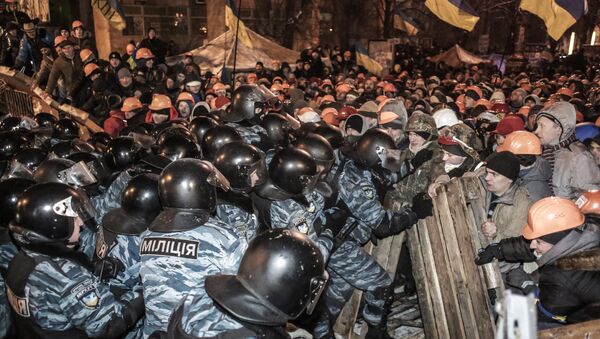BRUSSELS, November 17 (Sputnik) —The European Union and Ukraine signed an agreement on Monday to launch an EU advisory mission which will assist Kiev in rebuilding the country's civilian security sector, including the police system, said the head of the mission, Kalman Mizsei.
"The [EU] High Representative [Federica Mogherini] and Minister [Pavlo] Klimkin have just signed the Status on Mission Agreement for the advisory mission that I am heading. We believe that this is going to be a jump-start for our activities to advise the Ukrainian government and society on undertaking profound reform of their civilian security sectors, which has failed so spectacularly during the Maidan [protests] days," Mizsei told journalists, adding that the Ukraine's civil defense system needs to be rebuild "almost from scratch."
Mizsei said that the EU mission, that will be launched on December 1, will initially consist of more than 50 international advisers, a number which will most likely double as the project gets underway.
According to a press release published on the official website of the Council of the European Union, the mission with an initial mandate of two years "will assist the Ukrainian authorities in the field of civilian security sector reform, including police and rule of law."
The European Union announced its plans to set up an Advisory Mission for Civilian Security Sector Reform Ukraine (EUAM Ukraine) and allocate $3.6 million for its startup phase in July. European advisers will focus on the revision of security strategies and the implementation of reforms, in coordination with other international partners, including the Organization for Security and Co-operation in Europe (OSCE).
The political crisis in Ukraine erupted in November 2013, when the country's Cabinet of Ministers announced a halt to the country's European integration process. The so-called Maidan protests began in Kiev's central square and soon spread across the country. Ever since, pro-federalization rallies have been raging in Ukraine's east after the people in those regions refused to recognize the legitimacy of the country's government put in power following the coup in February.


